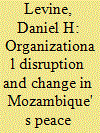| Srl | Item |
| 1 |
ID:
079771


|
|
|
|
|
| Publication |
2007.
|
| Summary/Abstract |
The role of UN peacekeeping missions has expanded beyond the traditional tasks of peacekeeping to include a wide range of political, economic, and humanitarian activities. While such expansion indicates an improved understanding of the complexities and challenges of post-conflict contexts, it also raises questions about whether UN peacekeeping missions are equipped to handle peacebuilding tasks. Evidence from a study of the peacekeeping mission in Sierra Leone suggests they are not. This article argues that peacekeeping missions are a poor choice for peacebuilding given their limited mandates, capacity, leverage, resources and duration. Peacekeepers should focus on peacekeeping, by which they can lay the foundation for peacebuilding. Peacebuilding should be the primary task of national governments and their populations
|
|
|
|
|
|
|
|
|
|
|
|
|
|
|
|
| 2 |
ID:
079781


|
|
|
| 3 |
ID:
079780


|
|
|
|
|
| Publication |
2007.
|
| Summary/Abstract |
The greatest contribution of complex peacekeeping operations to development lies in the restoration of basic peace and security, since this provides incentives for investment in the legal economy. But these operations also directly jump-start the local economy when help is most needed, early in the recovery process, providing employment and incomes that in turn support the restoration of peace and stability. This study collected and analysed data on the local economic impact of eight ongoing UN operations and one historical mission, concluding that they do more economic good and less damage than is commonly believed. Restoring basic security promotes an immediate upsurge in economic activity, some mission spending stimulates the local economy without generating widespread inflation. There is, however, room to increase positive local economic impact, especially in local procurement practice, in how missions go about hiring and paying local personnel and in reducing unintended negative impacts, particularly those associated with labour market distortions.
|
|
|
|
|
|
|
|
|
|
|
|
|
|
|
|
| 4 |
ID:
079779


|
|
|
|
|
| Publication |
2007.
|
| Summary/Abstract |
Mozambique returned to peace after a brutal civil war, despite imperfect disarmament. Many accounts make some appeal to the motivations of the parties to seek peace as a case of 'political will'. While these explanations are not false, an approach that looks to the Renamo insurgency's organizational structure can flesh out explanations of how changing attitudes moved the insurgency as well as illuminate points at which outside peacekeepers may find leverage. In particular, the UN mission capitalized on Renamo's difficulties and exploited its military focus and narrow political base by widely dispersing Renamo combatants during demobilization and fostering political party structures. These tactics helped to disrupt Renamo's ability to act as a spoiler.
|
|
|
|
|
|
|
|
|
|
|
|
|
|
|
|
| 5 |
ID:
079773


|
|
|
|
|
| Publication |
2007.
|
| Summary/Abstract |
The Security Council's failure to react when Israel initiated its third large-scale military incursion into southern Lebanon in July 2006 stands in contrast to the overall reform agenda towards a responsive and accountable Security Council. While the idea of 'responsibility to protect' increasingly gains recognition, the delay in reacting to this event demonstrated a setback contrary to legitimate expectations expressed by member states. This article uncovers the extent to which the international community has come to recognize the legal significance of the Security Council's responsibility under the UN Charter, what legal implications the failure of reaction could entail, and what needs to be reformed to rectify the 'responsibility deficit disorder' of the Security Council. It is argued that the Security Council's responsibility under Art. 24(1) carries growing legal significance, which requires reform of the 'attitude' and 'culture' of the Security Council towards conflict management by mainstreaming peacekeeping operations in its security policy
|
|
|
|
|
|
|
|
|
|
|
|
|
|
|
|